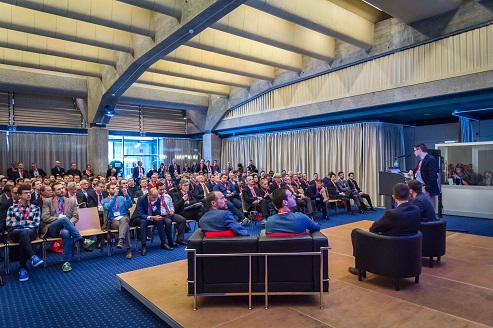LFF, Blockchain is the new black. The presentations dealing with it

The Lantern Fund Forum was held in Lugano on November 20th and 21st. Presentations and talks were held, with John Mauldin as the keynote speaker. In the next few days, Marketplus will report about the various presentations, which can be found here. https://finlantern.com/fundforum/slide-presentations-lff-2017/
Blockchain was therefore one of the main topics even in presentations.
The presentation by Equidato Technologies involved blockchain. According to SAP Digital report by the WEF, blockchain will enable 10 per cent of global GDP by 2027. The numbers will keep increasing and blockchain will be more and more vital for business, including pharmaceutics, engineering and services. Sophia TX proposes to be the first to SAP market for blockchain in industrial enterprise applications. The overview went on showing the advisory board and a few examples of how blockchain helps in the pharmaceutic industry: with its tracking it will help keep products safe and healthy, while ensuring none is counterfeit.
Jincor explained what a smart contract and blockchain are and where they are applied. Smart contracts are, according to their definition, self-executing contract with the terms of the agreement between buyer and seller directly written into lines ssecured, and continuously growing list of records, that are put in blocks. It’s used to create trust through immutable records. Benefits of smart contracts are, among others, cost savings, speed and trust. Among real world applications there are voting, transactions, copyright protection. Piracy, for example, creates a real loss in revenues. Jincor beta then explains its team and how they can work with clients.
Project Ambrosus was also presented at the LFF. The ecosystem combines sensors, blockchain protocol and smart contracts to build a universally verifiable, community driven ecosystem. Sensors become a sort of oracles, assuring integrity, marking and identifying products. Quality assurance in the food chain will be a very important application, on the one hand showing the authenticity of origins, on the other ensuring payments. The roadmap presented by Ambrosus shows that by 2020 they propose to build the world’s first open-source blockchain ecosystem for supply chain.
Swissquote also spoke about crypto assets, a new term proposal instead of cryptocurrencies which, according to them, is misleading. Decentralized applications provide a service that no single entity operates. They include payments, data storage, identity verification and much more. Blockchain combines decentralization, mining and cryptography. Decentralization eliminates the risks that come with data being held centrally. Public and private keys are used for cryptography, while hash/mining is any function that can be used to map data. Swissquote then explains how to invest in crypto assets, with direct investments, according to them, highly dispersed and with coins at risk for phishing, fake websites and so on. Indirect investments mitigates those risks. There are also a few factors to check before investing, such as the team, the community and the website itself. OneCoin was a Ponzi-type sacm scheme where it was impossible to check technical verifications and founders were implied in illegal activities.

